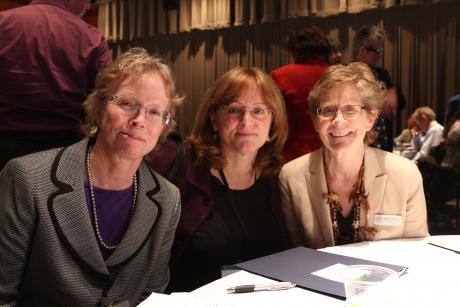Workplace Climate: Assessments and Interventions to Improve Diversity Among STEM Faculty
Davis, CA
This one-day system-wide Roundtable was co-sponsored by the NSF-funded UCOP ADVANCE PAID and UC Davis ADVANCE programs. It convened UC faculty and academic administrators from all 10 UC campuses to examine the issue of the workplace climate and the impact climate has on the recruitment, retention and success of diverse faculty. The Roundtable aimed to (1) Examine the issue of workplace climate and the impact climate has on the recruitment, retention and success of diverse STEM faculty; (2) Examine the varied dimensions of workplace climate, the factors that influence it, and how the experience of climate varies by gender and race/ethnicity; (3) Equip participants with tools, resources, and strategies for assessing and improving workplace climate for STEM faculty.
Event highlights included:
- A keynote address, “How Workplace Climate Changes the Knowledge We Generate” by Meg Urry, Israel Munson Professor of Physics and Astronomy, and Director, Yale Center of Astronomy & Astrophysics, Yale University.
- A panel that introduced quantitative and qualitative tools that are used to assess workplace climate. Panel members discussed the strengths and weaknesses of each and recommended strategies for disseminating and utilizing the assessment results. This panel also included a brief presentation of results from an analysis of race/ethnic and gender in the experience of faculty workplace climate using a cross-institution sample of COACHE data.
- A session that introduced how interactive theater programs are used to raise awareness about workplace climate issues and to identify strategies for addressing the issues identified. The presentation reviewed the development of such programs, the type of interactive styles employed, and the assessment of their impact.
- A panel presentation and discussion of how department-specific site visits that are sponsored by professional associations in STEM are organized to investigate departmental climate, to identify the factors contributing to “climate issues,” and to institutionalize practical approaches that improve the climate for faculty, staff and students.
- Attendee List
- Speaker Biographies
- Bibliography
- COACHE Summary Tables
- Pre-reading 3: The Climate for Women in Academic Science: The Good, the Bad, and the Changeable
- Pre-reading 2: Why Are There Still So Few Women in Science
- Pre-reading 1: Enhancing Department Climate brochure
- Roundtable Agenda
- Print-friendly




